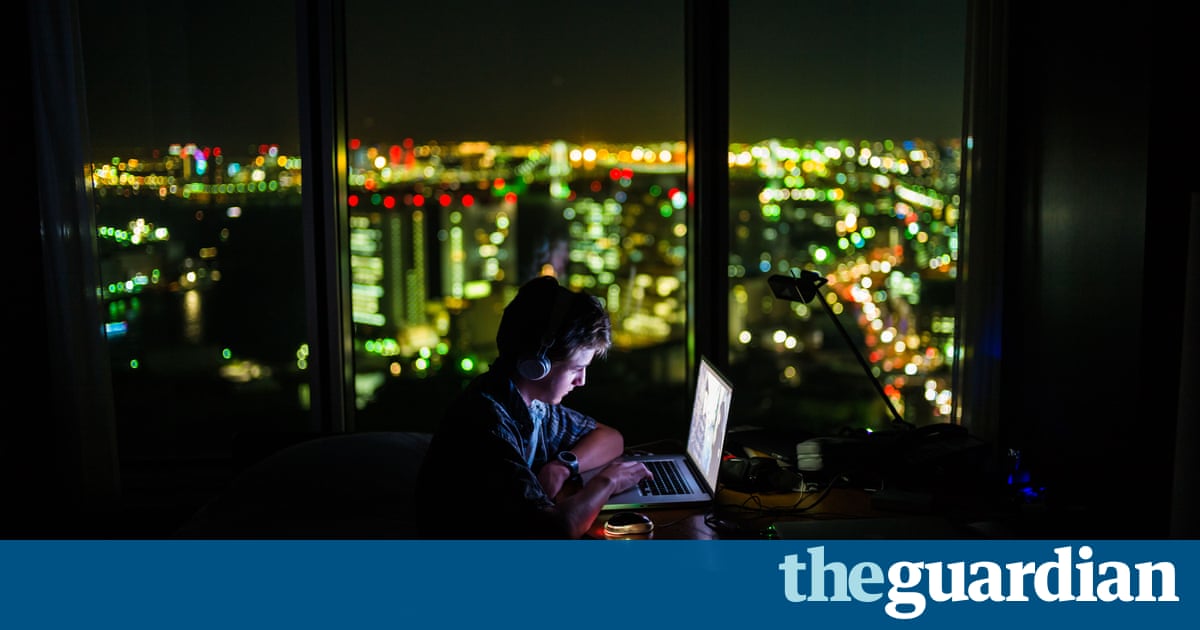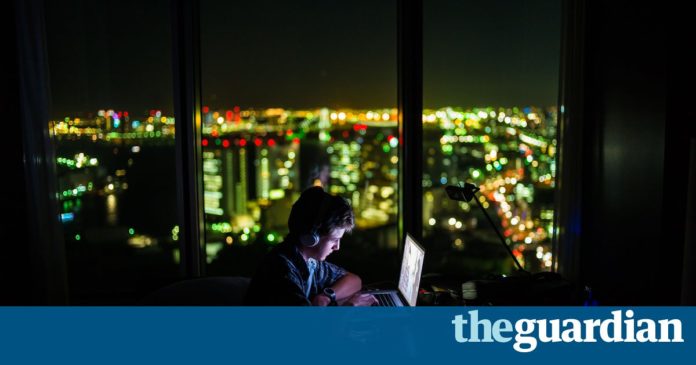Reports claim and parents worry that teens are suffering an epidemic of loneliness caused by social media. What is really going on?

To the average concerned adult, the epidemic of teenage loneliness currently sweeping the land is exemplified by a lone teen, probably dressed in black, school marks plummeting, lifeless eyes glued to Snapchat or some other social media site, mind unhinged by online pornography, ambitions nil.
The bit about Snapchat might be true. The rest, though, are questionable stereotypes, extrapolated into facts. First, the epidemic, widely reported in the media over recent months. In January, MPs launched the loneliness commission, which had initially been set up by Jo Cox, the MP who was murdered in June 2016. Soon after, the counselling service Relate released figures suggesting that todays teenagers are the loneliest generation yet a finding that a recent report by Londons Kings College seems to support.
But a closer look at the studies immediately reveals inconsistencies. The Jo Cox commission applies across all age groups, and its findings are still a long way off. Meanwhile, the Relate survey of teenagers covered 16- to 24-year-olds ie, only three years of teendom. Kingss poll shows that 62% of the 1,000 teenagers questioned said they sometimes feel lonely; to which one obvious response is: who doesnt? Childline says it received 3,000 calls from children asking for counselling between April 2016 and January 2017, but those figures look confusing when compared to a similar study by the same organisation in 2015/16, which revealed that 19,481 contacts were made by young people who were struggling with thoughts of ending their own lives more than double the number in the previous five years.
More confusing still are findings by the Mental Health Foundation it identifies 18- to 35-year-olds, not teenagers, as the age group most likely to struggle with loneliness. Other, more robust studies do indeed indicate very strongly that teenagers are struggling (for instance, between 2009 and 2016, the number of children and young people coming to A&E with psychiatric conditions more than doubled; in the past four years, hospital admissions for teenagers with eating disorders almost doubled, too). But is loneliness the root cause?
The problem begins with a mismatch between adult perception and teenage reality. Seventeen-year-old Maelo Manning, who started her politics blog, Libdemchild, when she was 10, thinks it has something to do with an air of hatred of teenagers. Even millennials judge us to be complacent layabouts who dont work hard. Nineteen-year-old Toni McMillan, who has set up her own online campaign fighting for equal work opportunities for teenagers, says some employers think young people are a nuisance or a liability. Most of us just want a chance to prove what we can do. Not having a job can be quite a lonely experience. The constant rejection makes you wonder if youll ever be given the opportunity.

By far the most common explanation offered in public by politicians and some sectors of the media for teenage problems is the dominance of social media, and its dark twin, online pornography. Why then, do so many teenagers disagree with this analysis? The idea that social media causes loneliness is completely wrong, laughs Manning. I think many adults are out of touch. Theyre on Facebook but, to us, its a site for OAPs. I think drugs cocaine, laughing gas or MDMA are more of an issue than sex, but to be honest, thats a very small minority. Lots of teenage girls now are very involved in feminism, and teenagers in general are really politicised especially when Isis was formed, then with Brexit and with Trump. The Scottish referendum got a lot of interest because of the discussion of lowering the voting age to 16.
Her insights contrast starkly with the received wisdom. Id say that loneliness is caused by parents who dont take an interest in their kids. It has to go beyond: How was your day? Oh, they said fine, so thats my role done. I see friends who have stay-at-home mums and they are still lonely. A lonely teenager isnt moping in their bedroom shes restless, unrooted. The wearing-black thing is definitely not true. Parents know theyre supposed to give their kids space, she says, but I think some parents are so worried about seeming intrusive that it becomes difficult for their kids to get close. We want to be able to talk to our parents. We really rely on their guidance.
Its worth questioning whether adult stereotypes of teenagers tell us more about parents or their children for instance, isnt it possible that the ambivalent feelings adults have about engaging on social media themselves have become entangled with their anxieties about their kids?
This generation of teens is not particularly rebellious they drink less, they do fewer drugs, they start having sex at an older age, says Natasha Kizzie, an executive director of the National Citizen Service, a government-funded scheme that enables 15- to 17-year-olds to set up their own social action projects. She says this generation is more serious about life than millennials, generation Y, generation X or baby boomers were at the same age. Theyre far more engaged; theyre highly preoccupied by their academics performance and their future job prospects … 62-70% of teenagers say it really matters to them what grades they get, and making their parents proud. Lower rates of face-to-face contact can harm a childs communication and social skills, but it would be a mistake, she says, to dismiss the enormous benefits of the internet. Whats more, she says, it is a huge error to conflate internet use with social media.
John and Stephanie Cacioppio of the University of Chicago Pritzker School of Medicine have carried out one of the most informative studies on the subject of loneliness, which they say is sometimes defined as a discrepancy between what you want in terms of social relationships and what you have. The perception that you are socially isolated means that you are on the social perimeter a dangerous place for a social animal, because you dont have the same mutual aid and protection you have when you have salutaryconnections with those in your social environment. When one feels lonely, the brain tends to go into self-preservation mode.
For a teenager, that feeling of being in a dangerous place might explain studies that show causal links between loneliness and violence. And teens would have good reason to fear that the danger is real, in view of the physical or psychological symptoms it can set into motion. In the elderly, loneliness can negatively impact both brain and body; increasing vascular resistance the risk of higher blood pressure and stroke. Loneliness also increases the activation of the hypothalamic pituitary adrenocortical system. This is a very powerful stress system that is elevated by loneliness, say the Cacioppios. This means that when people feel lonely, they might sleep the same number of hours, but they show more sleep fragmentation and micro-awakenings. The sleep is simply less restful and less restorative. This applies across all age groups, and tallies with Mannings theory of restlessness as a sign of loneliness. Loneliness per se is not the thing to be afraid of, says Kizzie. Better to think of it as a transition point.
Natasha Devon MBE is an author and campaigner, and the co-founder of selfesteemteam.org. She was asked to step down from being the governments mental health champion for schools after she blamed the governments testing regime for skyrocketing teenage anxiety levels. At the time, Jeremy Hunt was education secretary. Any time there was a crisis among teenagers, hed say: Social media. Its easier to park every teenage mental health concern with social media then nobody is to blame, says Devon. She has noted that cuts in sports, art and drama classes have removed many social opportunities for children and her extensive work in schools has led to some very interesting revelations. For instance, she has found that self-harming behaviour often doesnt conform to the notion of cutting that many of us might think of. Getting into fights they cannot win and self-poisoning are not uncommon behaviours, Devon says. She also describes a strange shift in rebellious hero-worship, at least among boys. Where music used to provider this, a certain demographic of teenage boys are watching a lot of Milo Yiannopoulos. They are following Breitbart on Twitter and defending those alt-right and sexist views in class. Yiannopoulos has built up a huge presence for himself on YouTube, which is where teenagers today find their heroes the influencers, in marketing-speak. My main concern, Devon says, is actually for boys.

Kieran Lacey, now 21, experienced his first depressive episode at 14. Not long after that, he tried to take his own life. The early teen years were quite good. Theres relatively little pressure on you. Then, at 14, 15, youre doing your GCSEs, youre reaching sexual maturity and the idea of being popular becomes central to your life, says Lacey. Again, Lacey didnt conform outwardly to many of the troubled-boy stereotypes. He had many friends (though saw himself as friendless); he did well at school. But some aspects of teenage life seem very old-fashioned. Boys are afraid to speak out when things are going wrong for them, says Devon. Theyre afraid of being vulnerable, but youre already vulnerable youre in the most vulnerable position of your life.
When Lacey confided in friends his age, they found him intense and morbid, and distanced themselves from him. When he turned to adults, they said it was just hormones they cant understand how serious it is. [Theyd say:] Oh, youll be fine in a few years.
After his suicide attempt, doctors diagnosed depression, which may have been triggered by the advent of his teens, but not caused by them. Since being at university he has launched a campaign to educate teenagers about mental health. His depression is now largely manageable, he says. What changed? I met my best friend.
The story of how Lacey met Paulo seriously undermines the theory that the internet is, by definition, bad for kids. I met him on a computer game internet forum. Lacey lived in a small town and felt isolated; Paulo lived and still does in Washington DC. Together they discovered a common interest in mental health issues, and went on to set up their own blog and livestream.
The webs supposed ill effects on teenagers have been sensationalised, Lacey thinks. Porn is more like background noise to people in their teens now. Saying that the net causes loneliness is like saying that television caused teenage loneliness in the 1960s.
The University of Chicago study is enlightening here. By studying brain activity, the Cacioppios have discovered that one of the unintended consequences of this implicit hypervigilance for social threats is that the lonely brain is more likely to interpret an ambiguous or mildly negative social interaction as threatening, leading to behaviour that makes the social interaction more negative and potentially threatening.
When Lacey was a teen, I felt that if I jumped off the school building, nobody would care. His solution? Hard work as escape: At 14, I just wanted to have a job and a career. He agrees with Devon about self-harm in boys. One friend would get tattoos on the most painful parts of his body. It was only much later that he saw it as self-harm.
The influencers and stars of YouTube and Instagram are legion, and often harmless. But Manning says they can be dangerous, too. The most popular Instagram accounts are fitness bloggers. Often theyre marketing stuff, like Fit Tea, which markets itself as a weight-loss aid, but theyre unaccountable and theyre not saying that theyre being paid for it. Girls want to emulate the body shapes of these new stars. What is the ideal these days? Its really skinny. Maybe with a big bum. Its a horrible culture. So the bloggers are to blame for body shame? No. There is a connection between lack of confidence in body image and what is happening at home. I have a friend who is convinced she is chubby. Even going to the cinema is really difficult for her. Her parents dont take much interest in her. She has that restlessness I was describing before.
Then she makes a fascinating observation. Theres an unconscious pecking-order, race-wise. Manning herself is half-Indian. White women are glorified on social media. Everyone reads all the stuff about racism on Buzzfeed, so they know all the terminology, but at the same time, if you have green eyes and straightened hair, youre considered more beautiful.
What can adults do to help? Never assume, says Kizzie. Teenagers need downtime and that can include looking at SnapChat. At the same time, its crazy how much they say their parents matter. Theres a huge reliance on mum looking to her for solace and direction.
What can teenagers do? Find what youre interested in, whether its Harry Potter or cooking, says Lacey. Take control of life choices: I have seen very lonely people turn around their lives when they decide to do the GCSEs they, not their parents, want to do. The Cacioppios make an even simpler suggestion, that perhaps teenage and adult loneliness are close to identical: a need for mutual aid and protection; the sense that people can accomplish more together than alone. Is it inconceivable that adults might go some way towards curing their own loneliness if they can desist from putting their teenagers in a box marked alien?
Read more here: http://www.theguardian.com/us



